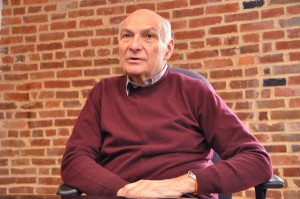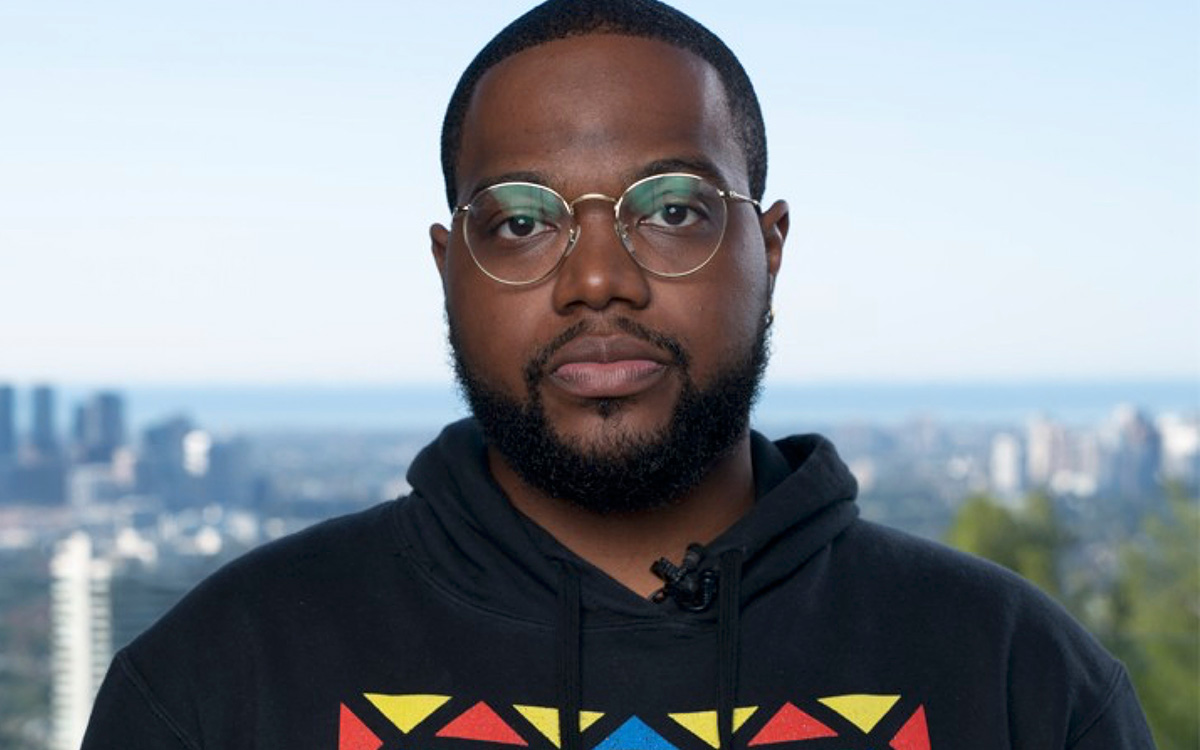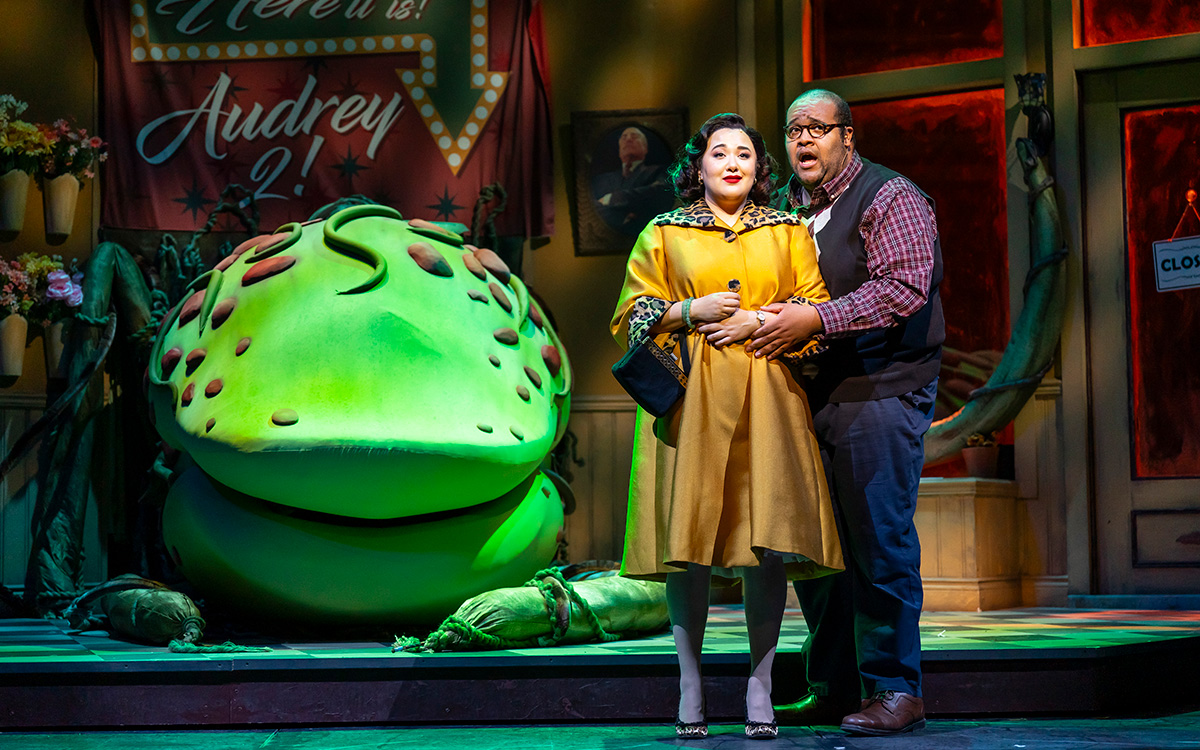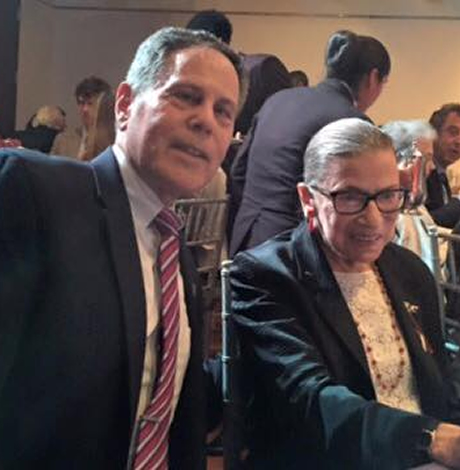Theater
The path of Kahn
Keeper of the classics celebrates 25 years directing theater in D.C.

Michael Kahn has a long reputation of making classical theater accessible to contemporary audiences. He’s celebrating 25 years in town this month. A party is planned for October. (Blade photos by Michael Key)
When Michael Kahn came to Washington in 1986, he intended to stay for two years tops. The plan was to share his theater expertise for a while and then get back to his life in New York and continue teaching and staging plays and operas.
But luckily for local theatergoers, things played out very differently. Instead, Kahn remained in town as artistic director of the Shakespeare Theater Company (STC) where he’s currently gearing up for the classical troupe’s 25th anniversary season.
Seated at a long conference table in STC’s busy administration offices on Capitol Hill, Kahn explains how he initially came to D.C. to help save the then-failing Folger Theatre and stayed on when he was named artistic director of a newly created Shakespeare Theatre at the Folger. Later he orchestrated the Shakespeare Theatre’s move to the larger Landsburgh location, adopted the STC name and more recently helped to expand the company’s home with the grand 775-seat Sidney Harman Hall.
“I took the job happily but not for a moment along the way did I think I was in for the long haul,” says Kahn, who is gay. “I’d think about leaving but then something interesting would always come up — an expanded season, the educational program, the STC Free-For-All [a terrific Washington tradition that annually offers free performances of a Shakespearean classic to the general public] and, or course, I’m glad I stuck around.”
Over the years, Kahn has successfully pursued STC’s core mission of doing classic theater “in an accessible, skillful, imaginative, American style that honors playwrights’ language and intentions while viewing their plays through a 21st-century lens.” In doing so, he’s created arguably the nation’s premier classical company and emerged as one of America’s foremost directors of Shakespeare.
Kahn alone selects the STC’s titles and directors. For the upcoming milestone season that kicks off in late August, Kahn wants to make things a little special. In addition to seven plays (a mix of dramas and comedies), he plans to celebrate the Bard with a pair of musicals performed in concert-style staging: Rodgers and Hart’s “The Boys from Syracuse,” a late-1930s swing version of “The Comedy of Errors;” and John Guare’s rock opera “Two Gentlemen of Verona.”
As a special anniversary treat to himself, Kahn will direct Eugene O’Neil’s “Strange Interlude,” a famously difficult play about love and deception that he’s longed to stage for years. He also plans to work with some of his favorite actors (many of whom can’t be named until contracts are signed), as well as two former STC associate directors who’ve made good outside of the nest – P.J. Paparelli (artistic director of Chicago’s American Theater Company since 2007) and successful New York-based freelance director Ethan McSweeny — who’ll stage “The Two Gentlemen From Verona” (the original non-musical) and “Much Ado About Nothing,” respectively.
D.C. native McSweeny met Kahn while still a secondary student at St. Albans School. He invited the director to speak to his drama club and Kahn agreed. During college and after, he interned with Kahn at STC, and at just 22, he was named the company’s resident assistant director.
“My four years at STC were graduate school for me,” McSweeny says. “I think directing is a craft that’s learned from watching a master craftsman like Michael in action. He doesn’t dictate. He just does it.
“Michael is also a tough teacher. With him, you’ve got to bring your A game,” McSweeny adds. “We alums of Kahn all maintain high standards — we inherited that from Michael. But in addition to the stick there’s the carrot: Michael can be a torrent of creative passion and it’s thrilling to be in the vortex with him.”
The school of Kahn isn’t reserved exclusively for promising directors. Actors have benefited as well. Via phone from New York, Veanne Cox, a delightful, versatile actor who rapidly has become an STC regular, recounts how six or so years ago Kahn happened to catch her playing the very dramatic part of a woman dying from cancer, and afterward matter-of-factly commented that she was made for Restoration Comedy. The story still makes Cox laugh, and she is quick to add that soon after Kahn cast her in STC’s production of the classic comedy “The Beaux Stratagem” and changed her life.
“Prior to knowing Michael I’d done very little classical theater,” Cox — who memorably appeared as the heckler in a “Seinfeld” episode — says. “Because of him, my career is flourishing in new ways. My best work experiences have been at STC, better than Broadway and off-Broadway. [In the fall, Cox is slated to return to STC as Beatrice in “Much Ado About Nothing.”] The actors are exquisite to work with, and D.C. audiences are better educated than New York audiences about the works. Because of Michael, they understand language and themes. He has trained them how to appreciate and understand classical theater.”
STC is not Kahn’s first act, far from it. He began his career in New York in the ‘60s, directing for gay playwright Edward Albee and Joseph Papp’s Shakespeare in the Park. His Broadway successes include revivals of “Showboat,” “The Royal Family” and “Cat on a Hot Tin Roof (starring a young and gorgeous Elizabeth Ashley). He’s also earned excellent reviews staging opera and regional theater. Before coming to Washington, he was artistic director for the American Shakespeare Theatre in Stratford, Conn.; producing director for the McCarter Theatre; and founder and head of The Chautauqua Conservatory Theater. In addition, Kahn maintained a parallel career as an educator, commuting to Manhattan as head of the Drama Division of New York’s prestigious Juilliard School until 2006. He has won multiple Helen Hayes Awards for his STC work, and is frequently honored by the LGBT community.
Repeatedly, Kahn’s skills and impressive vitae have and continue to lure well-known actors like Elizabeth Ashley, Stacy Keach, Kelly McGillis and the late Dixie Carter to STC. He enjoys working with big names. Usually, Kahn says, big names become famous because they’re good.
“Well, not always,” he backtracks. “Anyone who waits in line at a supermarket can’t help but know Kim Kardashian, but that doesn’t mean I’ll be working with her any time soon.”
Growing up in Brooklyn as an only child with “all the vices and problems that that entails,” Khan was just 5 when his Russian immigrant mother introduced him to the works of Shakespeare. He attended High School for the Performing Arts and went on to Columbia University where he directed plays for the French club (a pre-famous Andy Warhol designed the set for one of the productions). Kahn came out early. He never struggled with his sexual orientation, only unrequited love. As a young man he carried an unreciprocated torch for gay playwright Terrence McNally. He outed himself to the Washington Post in 1986 and believes a lot of conservative society’s problems with the arts is, in fact, subterranean homophobia. Lately he’s come to the conclusion that good direction requires sensitivity, and whether it comes from a gay or straight person makes little difference.
Kahn says it’s possible to have a relationship despite an all-consuming professional life, but you pay a price: “With me here and Frank [Donnelly, Kahn’s late, longtime partner] in New York, we were often apart. I wasn’t there when he died.” A psychotherapist, Donnelly died in his sleep shortly after 9-11. He’d spent his last days counseling those who had lost loved ones in the World Trade Center collapse.
When asked if he’s in a relationship now, Kahn replies playfully, “Yes, at least that’s what it says on Facebook.”
And does he miss working in New York?
“I could never do in New York what I do here,” he says. “I’d be in a 200-seat theater with a much smaller budget. They’re just not interested in lesser known shows like Musset’s ‘Lorenzaccio” from our [2005] season, or David Ives’ adaptation of Regnard’s 1706 masterpiece ‘The Heir Apparent’ that we’re doing in the fall.”
Highfalutin legacy talk isn’t Kahn’s style; however, he will say that he “really wants to make sure the theater is in a good financial position so anyone who wants to take over [his] job will also want to stay.” But for today, Kahn continues doing what he does best — thinking of ways to bring more high quality, classical theater to Washington.
Theater
Jessica Phillips shines in ‘Penelope,’ a ‘pandemic parable’
Alex Bechtel was inspired to write about loneliness, waiting, separation

‘Penelope’
Thorough April 28
Signature Theatre, the Ark
4200 Campbell Ave, Arlington
$40-$99
Sigtheatre.org
In the new musical “Penelope,” Broadway’s Jessica Phillips gives an unforgettable take on the title role torn from the pages of Homer’s “Odyssey” — more or less. Fortified by bourbon and backed by a Greek chorus of musicians, the character uncharacteristically steps out from the background to share her story surrounding two decades waiting on the island kingdom of Ithica for the return of her absent husband Odysseus.
Sometimes described as a “pandemic parable,” the 70-minute work is based on composer/playwright Alex Bechtel’s personal experience. While separated from his partner during COVID, he was inspired to write about loneliness, waiting, and separation, a subject Phillips was eager to tackle.
An accomplished Broadway actor and mother of two, Phillips, 52, is best known for memorable turns in “Dear Evan Hansen,” “The Scarlet Pimpernel,” “Next to Normal,” and “Priscilla Queen of the Desert.”
Two years ago, she made news for coming out as queer after having long been identified as straight. Parts of the theater scene were caught a bit off guard, but only momentarily. Now, she lives in New York with her partner Chelsea Nachman, a theatrical publicist.“We share the same professional community but in very different roles. I think that makes life easier for us.”
Currently enjoying an extended run at Signature in Arlington where the trees are in bloom, she spares time for a phone interview, starting off with“Perfect timing. I’ve just finished the last song on Beyonce’s ‘Cowboy Carter.’ Let’s talk.”
WASHINGTON BLADE: Increasingly, I hear artists report having been deeply changed by the pandemic. Did that have anything to do with your coming out in 2022?
PHILLIPS: Definitely. During the pandemic, those of us in the arts were in deep crisis, because our industry had collapsed in almost every way. At the same time, that space allowed us to be contemplative about where we were. For me, that period of time gave me the space to both come to terms with and confront those fears about saying who I was, out loud and publicly.
BLADE: Did you have professional concerns?
PHILLIPS: Oh yeah, I was specifically worried about perception. Not so much about being queer but more what it meant to have come out relatively late in life. I had some fear around whether people would take me less seriously.
At the same time, I was nervous about being fully transparent and worried about my privacy and being vulnerable. Like other women I knew, I was more comfortable dealing with traditional societal expectations in America. I grew up with those cultural expectations and thought of myself in those terms for a long time.
BLADE: What changed?
PHILLIPS: What’s been so freeing for me, I can confront how I took on those expectations and say I’m not going to let those determine how I live my life. I get to decide.
BLADE: There’s a lot of wonderful storytelling in “Penelope.” What’s been your way into that?
PHILLIPS: My way of moving through the show is allowing this character to experience all five stages of grief. Humor, slapstick comedy, bargaining, denial. And ultimately acceptance and deep grief.
When an audience is alive and invested, it’s palpable and elevates the storytelling. When an audience is having a thinking rather feeling experience that changes the tone of my storytelling and not in a bad way.
It’s interesting how much they’re a part of everything. It’s really intimate. The audience is just six feet away. It’s a unique experience and we’re on this ride together. And I find this to be a really beautiful and satisfying experience that I’ve not had before.
BLADE: After Signature, what’s next for “Penelope”?
PHILLIPS: That’s the million-dollar question. Hopefully we’ll take it forward to New York or tour it, but that requires willingness and money. I do think there’s a broad audience for this. It’s beautiful, unique, artistic, really emotional, and at the same time possesses an intellectual quality that’s missing from a lot of commercial theater these days.
BLADE: And what’s next for theater?
Phillips: I think one good thing that came out of the pandemic is that people like Alex Bechtel had an opportunity to create. In the next decade we’re going to see the results of that. I think we have some extraordinary things to look forward to. If a work like “Penelope” is any indication, we’re all in for something really good.
Theater
‘Nancy,’ soaked in ‘80s nostalgia, is ‘queer AF’
Mosaic production led by out director Ken-Matt Martin

‘Nancy’
Through April 21
Mosaic Theater Company at Atlas Performing Arts Center
1333 H St., N.E.
$53-$70
Mosaictheater.org
Set in 1985, smack dab in the middle of the Reagan years, Rhiana Yazzie’s “Nancy” is totally soaked in nostalgia: shoulder pads, high hair, Van Halen, etc. For some theatergoers, it jogs the memory and for others serves as an introduction to an alien era.
Out director Ken-Matt Martin describes the production (now at Mosaic Theater) as “queer AF.” He continues, “But that’s true with everything I touch. My aesthetics and interests are unapologetically queer. When you first walk into theater, you see a big ass picture of Nancy’s face. The whole play is kind of set on her face.”
Martin, who puts his age as “somewhere over 30,” gives a brief rundown via telephone: “‘Nancy’ places two women on parallel tracks and we get to watch them on a collision course. Esmeralda [Anaseini Katoa], a Navajo mother and advocate determined to improve the condition of her family and reservation. Her story is juxtaposed to that of Nancy Reagan [Lynn Hawley] who’s busy at the White House consulting with society astrologer Joan Quigley to help guide Reagan [Michael Kevin Darnall] and his administration. The women’s worlds come together over Nancy’s direct ancestral connection to Pocahontas.”
The busy storyline also includes a moment surrounding Rock Hudson’s final days, a moment when well-coiffed, clothes-crazy Nancy was presented with the opportunity to make a difference but chose not to.
“And the work doesn’t let Nancy off the hook,” adds Martin. “It’s a full meal of a play.”
Produced in partnership with New Native Theatre based in the Twin Cities, Mosaic’s epic offering, a very D.C. play about ancestry and ambition, almost looks at Ron and Nancy as cartoon characters but isn’t without empathy.
Martin and Yazzie both love satire and absurdity; they enjoy comedy and things that are funny until they’re not. So, the evening shifts in tone as it moves into more serious areas, particularly an exploration of how the ‘80s and Reagan’s failed trickle-down agenda set the stage for many of today’s problems.
The director’s way into theater was as a child actor. After successfully begging his mother to drive him from their native Little Rock, Ark., to a regional Atlanta audition, he booked an appearance on Nickelodeon’s landmark series “All That” and snagged an agent in the process. He continued to act for a time before becoming interested in other facets of showbiz.
After graduating with an MFA in directing from Brown University/Trinity Repertory Company, Martin embarked on a terrifically busy schedule. In addition to freelance directing, he has helmed and helms various prestigious companies as artistic director and managing producer (Pyramid Theatre Company in Des Moines, IA, Victory Gardens Theater in Chicago, and was recently appointed Interim Artistic Director of Baltimore Center Stage and Arkansas Repertory Theatre.)
Currently an itinerant professional (Martin gave up his place in Chicago and hops from job to job where they house him), he says, “It can get a little old, but overall, not bad at all.”
Next up, Martin is directing Olney Theatre’s production “Long Way Down,” the adaptation of a Young Adult novel by DMV native Jason Reynolds. “It’s a big regional tryout that after a limited engagement in Olney leaves for the Apollo Theatre in New York. I’m excited.”
Martin is at home with plays that are tricky to stage, making him a good fit for “Nancy” with its multiple locations, scope, and scale. He’s enjoyed the challenge of the work’s collapsing time lines and the playwright’s tough, complicated, smart, and fast-moving language.
“Perhaps most importantly,” he adds. “Rhiana has entrusted me with the opportunity to tell this very unique story, a story that can resonate with Native people and Native audiences. This part is very new to me as a director.”
Theater
Talented pair of local queer actors tackles ‘Little Shop of Horrors’
Ford’s production features terrific score

‘Little Shop of Horrors’
Through May 18
Ford’s Theatre
511 10th St., N.W.
$33-$95
Fords.org
Ever since premiering off-Broadway in 1982, “Little Shop of Horrors” has drawn a devoted following of avid audiences as well as performers eager to act in the show. Now playing at Ford’s Theatre, the doo-wop, dark comedy features a terrific cast including a wildly talented pair of local queer actors who’ve longed to appear in the show since they were kids.
Set in the urban 1960s, Alan Menken and Howard Ashman’s hit show with a terrific score follows the wacky rise of Seymour, a nebbishy florist in a Skid Row shop who changes his fortunes by unintentionally marketing an exotic, human eating plant.
Chani Wereley, 28, who plays Seymour’s love interest Audrey, a hyper femme downtowner with an edge, has had her on eye the role for years. Wereley says, “Audrey’s been around the block more than once, but I approach her as a person who moves through the world with love and hope.”
The queer D.C. native adds, “On long trips to visit family in Canada or Florida, the first thing we’d do is pop a ‘Little Shop of Horrors’ video [film version] into the car’s VHS player. I’ve watched is so many times, I could quote the whole movie to you.”
After auditioning to play Audrey in director Kevin S. McAllister’s production at Ford’s, Wereley never thought she’d book the part, and when they said she got it, she cried.
Similarly, Tobias A. Young, 34, the pansexual actor who voices the part of the bloodthirsty plant affectionately dubbed Audrey II, explains his intense interest in the work: “I started watching the film in ’86. Growing up as a little gay boy in Calvert County, Md., I wanted to be blonde Audrey [played by Ellen Green in the movie]. I didn’t know much about musicals at the time, but I was absorbed.”
When asked by Ford’s to play the voracious plant Audrey II without auditioning, his reply was an unhesitant “yes.”
Voicing a role requires Young to sing from backstage in a black box rigged with monitors and a mixing board. He says, “people ask if I’m singing from inside of the ever-growing, scary plant. No, I’m not, and that’s fine. But let’s face it, actors love to be seen on stage, but I don’t feel entirely unseen as Audrey II.”
He’s worked hard and successfully with formidable puppeteers Ryan Sellers and Jay Frisby to bring parts of himself to the carnivorous plant — his sassiness, own movements, and even a tilt of his head; their efforts have drawn the actual Young into the show.
Both Wereley and Young possess gorgeous, emotive voices as evidenced by Wereley’s striking rendition of Audrey’s “Suddenly Seymour,” and Young’s soulful “Feed Me (Git It).” Additionally, both actors are also big on queer representation in theater.
When her young pals were listening to Britney Spears, Wereley was dancing to retro tunes like “Mashed Potato Time,” and her favorite song to this day, the Shirelle’s girl group anthem “Will You Still Love Me Tomorrow.” As Audrey, Wereley eschews the character’s usual platinum hair for a bouncy brunette, cherry-streaked wig, tight pencil skirts, swing coats, and her very own half-sleeve tattoo.
“It’s important for people to see themselves on stage,” she says. “Seeing me or someone like me is inherently interesting. Being that person on Instagram or with the institution, cast, or audiences is meaningful. It’s important.”
In 2011, a couple years after finishing high school, Young landed a part in “Dream Girls” at Toby’s Dinner Theatre, and he’s been working professionally ever since. Growing up, he didn’t see a lot of himself – Black and queer – on social media. He now wants to be open and honest for those out there who might not feel seen, he says
An introvert who lets everything loose on the stage, Young says, “theater is a safe space for queer people. That’s the first place we feel safe, particularly in school. And this is why we need theaters in schools, now more than ever.”
He adds, “What’s great about Ford’s is its surprises, especially when they switch up casting. It’s meaningful to see the shows you love, but why not see them with a twist? Using unexpected actors and incorporating queer people just makes it that much better.”
-

 Africa4 days ago
Africa4 days agoCongolese lawmaker introduces anti-homosexuality bill
-

 World4 days ago
World4 days agoOut in the World: LGBTQ news from Europe and Asia
-

 District of Columbia3 days ago
District of Columbia3 days agoReenactment of first gay rights picket at White House set for April 17
-

 Africa3 days ago
Africa3 days agoUgandan activists appeal ruling that upheld Anti-Homosexuality Act










